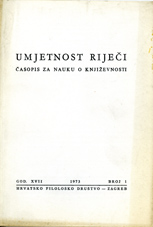Heineove pjesme iz Groba od madraca
Heine's poem from the "Matratzengruft"
Author(s): Wolfgang PreisendanzSubject(s): Literary Texts
Published by: Hrvatsko filološko društvo
Summary/Abstract: The author believes that, after publishing three books of poems, Heine was preparing a fourth, Das Buch Lazarus, and interprets the poems which were, in his opinion, written for this new book. These poems differed radically from the poetry Heine had written up to that time. The author underlines this difference by analysing the critical reception of Heine's lyrical poetry by his own contemporaries and by more recent critics. From the time he published his first book to the present day, Heine's poetry has aroused diametrically opposed critical opinions: the highest praise and strongest censure. The author tries to explain this by presenting the »horizon of expectation« of Heine's time. Since 1945 there have been attempts to avoid these extremes and to find more adequate formulations. Critics agree today that alienation and contradiction, or contradiction based on alienation, are the true subjects of Heine's poetry. Modern critical opinion on Heine's poetry is summarized by the author in eight points followed by the conclusion that it was H eine who introduced into lyrical poetry the theme of alienation between the practical and the poetic consciousness. The author insists, however, that Heine's irony does not destroy the ideality of the poet's vision of the world; it only reminds us of circumstantial reality and capitulates before it because this reality does not accept the poet's vision. The author points out that such conclusions could only have been reached through an analysis ot the history of Heine criticism which enable the modern scholar to discover the relative value and historical limitations of his own judgement. The author further makes a clear distinction between Heine's early lyrical poetry and the poems written for Das Buch Lazarus. In those poems irony is replaced by »lack humour. Heine called himself a humorist. The author feels, however, that this kind of humour cannot be defined by Freud's conception of humour but, rather, by that of Joachim Ritter. He also relates the marked change in Heine's poetry to the birth of Hugo's conception of the grotesque at about the same time. Hugo believed that by mixing the grotesque with sublime, the poet could create a more adequate image of reality. Characterizing this change in H eine as a turn towards realism, and attempting to formulate a definition of realism in four main points, the author defines Heine's poems written for Das Buch Lazarus as marked examples of realistic lyrical poetry.
Journal: Umjetnost riječi
- Issue Year: 1973
- Issue No: 1
- Page Range: 41-65
- Page Count: 25
- Language: Croatian
- Content File-PDF

